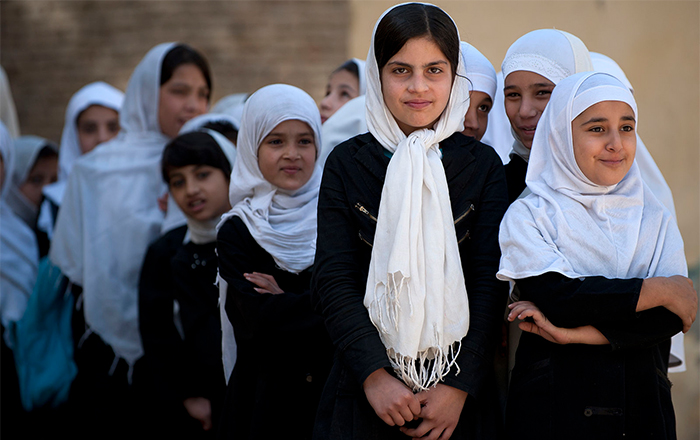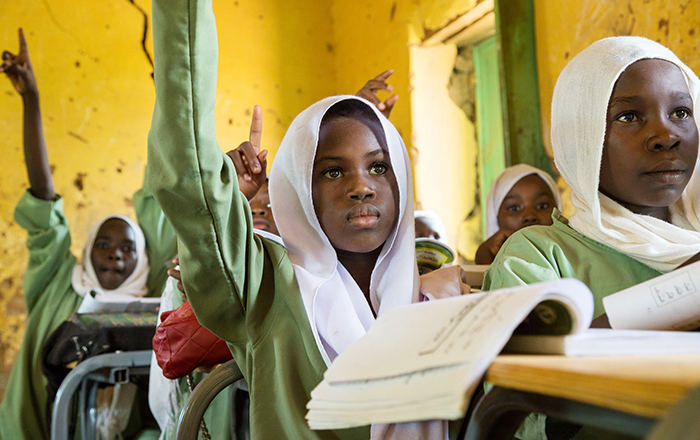
Worldwide support organizations usually initially prioritize pressing, life-saving companies over training, regardless of the latter’s significance. (credit score: Wikimedia © NATO Coaching Mission-Afghanistan.)
“Returning to high school … returning to life,” is the utmost dream for 14-year-old Salma, who has been displaced together with her mom and siblings to the southern Gaza Strip for over a month due to the continued conflict there.
It isn’t the primary time that training has been disrupted in Gaza, however this disruption is the longest.
Salma, a center college scholar, says in a voice message through WhatsApp, “It doesn’t look like we’ll return quickly, the conflict appears infinite. Even when the conflict stops now, every little thing is destroyed, our houses and faculties. I can’t inform how tomorrow will appear to be.”
Salma is only one of greater than 129 million out-of-school girls all over the world, ladies who, like Salma, dwell in areas affected by battle and face extreme obstacles to acquiring an training. Not solely are they greater than twice as prone to be out of college than ladies residing in non-conflict zones, they’re additionally 2.5 times more likely to be out of college than boys in battle zones. With the growing prevalence and period of conflicts worldwide, already widespread gender disparities in entry to education are prone to improve. The implications of those rising academic disparities shall be detrimental for each the women themselves and their communities.
“Conflicts are actually exacerbating current inequalities in entry to training and expertise constructing, notably adolescent ladies and ladies with different intersecting vulnerabilities, akin to the women with disabilities or refugee ladies or who’re forcibly displaced,” stated Jihane Latrous, gender supervisor at Education Cannot Wait, a world fund dedicated to discovering methods to fulfill the tutorial wants of youngsters impacted by conflicts.
Battle zones erect a variety of boundaries that disproportionately affect ladies’ entry to training. First, the bodily destruction of colleges and public infrastructure profoundly damages academic methods’ potential to perform and limits the provision of protected studying environments. As in Salma’s case, the compelled displacement of households normally disrupts the education of younger kids and adolescents. It might additionally result in the lack of tutorial information and different documentation wanted by school-age kids to proceed their training elsewhere.
Second, worldwide support organizations usually initially prioritize pressing, life-saving companies, akin to the supply of meals, shelter, clear water, and medical help, over training, regardless of the latter’s significance. When support organizations do supply academic alternatives to displaced people and refugees residing in momentary camps, they usually prohibit their choices to elementary training, leaving a niche in entry to increased ranges of training.
Whereas these boundaries affect all school-age kids, they have a tendency to fall heaviest on ladies. Circumstances in conflict-affected areas have a tendency to strengthen discriminatory gender norms and dangerous cultural practices, akin to early marriage and compelled labor.
A Rising International Risk
In April 2014, Boko Haram militants abducted 276 girls from the Authorities Women Secondary College in Chibok, Borno State, Nigeria. The group, whose identify roughly interprets to “Western training is forbidden,” particularly focused ladies, pushed by a perception that ladies shouldn’t be educated and will as an alternative be married off at a younger age. The Chibok abduction was not an remoted incident. Boko Haram has been accountable for quite a few assaults on faculties, ensuing within the displacement of hundreds of scholars and lecturers, notably in northeastern Nigeria. These assaults have created a local weather of concern and hindered ladies’ entry to training, as many households are actually reluctant to ship their daughters to high school. Whereas among the Chibok ladies have been rescued or managed to flee over time, a big quantity stay lacking.
“Stopping ladies from receiving training is normally used as a weapon of conflict in lots of conflict-affected nations,” stated Eline Versluys, training supervisor with Gender at the Centre Initiative, a program coordinated by the United Nations Women’ Training Initiative and the UNESCO Worldwide Institute for Instructional Planning to advertise gender equality “in and thru training” in sub-Saharan Africa.
Conflicts affect ladies internationally. A report by the International Coalition to Defend Training from Assault documented direct assaults on feminine college students and lecturers in at the very least 18 nations in Asia, Africa, and the Americas between 2014 and 2018.1 Extra not too long ago, the continued conflict in Ukraine has impacted access to schooling in that nation as properly. (Learn this associated article: Mired in War, Ukraine Starts a New Academic Year).
The kinds of assaults on ladies range, together with the shelling of ladies’ faculties and the kidnapping of feminine college students. Reports have additionally emerged of sexual violence and forced marriages in some cases. There are additionally much less direct types of assaults, akin to closing ladies’ faculties or reallocating assets from ladies’ to boys’ training, threatening ladies to maintain them away from college, and implementing restrictive gown codes by way of violence.
In line with Versluys, “Gender discrimination truly turns into worse through the battle because the underlying gender norms then develop into extra intensified. The affect of this doesn’t cease with ladies alone, however extends to all the society.”
For instance, two years in the past in Afghanistan, the Taliban applied a ban on ladies attending college past the sixth grade, making the nation the one place on the earth the place such restrictions on feminine training exist. Sadly, girls in Afghanistan proceed to face limitations that stop their pursuit of training past a sure degree, and the chance to check overseas stays out of attain for them.
“Women are being punished simply because they’ve entered puberty, and their hopes and goals are taken away from them,” stated Maryam Rayed, a Fulbright scholar who was born and raised in Afghanistan.
Battle may have intensified gender-based violence in neighboring Iran. Final yr, media shops reported numerous cases of poison attacks that affected tons of of ladies, roughly 10 years of age, in faculties positioned in Qom, within the central area of Iran. These assaults passed off throughout a interval of protest in Iran, following the loss of life of Mahsa Amini, a younger girl who died after being arrested by the morality police for breaching the nation’s stringent gown code.
“Improve in assaults on ladies’ training is deeply regarding, it signifies a grave violation of their rights, perpetuating cycles of inequality and denying them alternatives for empowerment and safety,” stated Latrous. “It’s essential to make sure that there’s not solely entry to training, but in addition retention.”

The kinds of assaults on ladies range, together with the shelling of ladies’ faculties, the kidnapping of feminine college students, and sexual violence and compelled marriages in some cases. (Picture: © GPE/ Kelley Lynch)
Escalating Assaults Demand a Complete Protection
In 2015, the Safe Schools Declaration, a political settlement outlining a sequence of commitments to safeguard training throughout armed conflicts, was opened as much as endorsements by UN member states. By endorsing the declaration, governments dedicated to taking steps to stop assaults on faculties, to help the restoration of training in conflict-affected areas, and to prioritize the protection of scholars, lecturers, and academic amenities. The declaration underscores the importance of uninterrupted entry to high quality training for all kids, together with ladies, each throughout and after conflicts. Regardless of 119 nations signing on to the declaration, assaults persist, and the risk continues to escalate. In 2020 and 2021, more than 5,000 instances of violent assaults on academic institutions had been reported.
“Women’ training extends past mere enrollment in faculties. It encompasses the supply of a safe studying setting that allows ladies to finish all ranges of training, purchase expertise vital for the workforce, develop socio-emotional talents, make impartial choices, and contribute to their communities and the world,” stated Latrous.
As boundaries can range, starting from gender-based violence to the gap between faculties and refugee camps, it’s vital to carefully study every context and reply accordingly, GCI’s Versluys believes. She emphasizes the significance of worldwide establishments cooperating with native communities. “Participating with civil society is essential for us to result in change, particularly in terms of difficult dangerous gender norms,” she stated. “Attaining gender equality goes past mere entry to training, as further challenges like being pregnant or bullying could come up. Due to this fact, addressing a variety of points past gender parity is important to make sure complete help for ladies’ training in conflicts.”
In line with Versluys, making certain the precise of ladies to an training begins with academic curricula that educate boys the significance of training for each genders. “This transformative training also needs to not be restricted to colleges however prolonged to the local people, the place it helps and embraces ladies’ training as an alternative of perpetuating battle,” she stated.
Carrie Bernier, government director at Educate Girls, agrees with Versluys on the significance of participating native communities in any program tackling ladies’ training and altering gender norms.
“When the neighborhood is concerned in regionally led efforts, it helps to drive success and scale,” she stated.
Educate Women employs a community-based method, working carefully with native communities, dad and mom, and authorities stakeholders to deal with social and cultural boundaries to ladies’ training. The charity is headquartered in america, however its major operations and affect are centered on ladies’ training in India.
“Utilizing good knowledge and know-how with high-touch neighborhood engagement and partnerships with state ministries, we will create a sustainable and systemic answer within the hope that sooner or later each woman shall be in class and studying,” Bernier stated, stating that “know-how and use of machine studying helped us function at scale as we sought to geo-locate the out-of-school ladies in probably the most rural and poverty-stricken areas of India.”
Extra Is Wanted from International Communities and Native Companions
Whereas conflicts all over the world persist and develop, the continued help of worldwide establishments for ladies’ training turns into more and more essential. As a world neighborhood, we should establish measures that guarantee and promote gender equality.
“It’s essential to make sure that all initiatives align with and fulfill the worldwide commitments established. Multi-year funding with flexibility is crucial, accompanied by a sturdy system for monitoring accountability and outcomes,” stated Latrous. “This mechanism ought to permit us to watch the extent to which we’re reaching the commitments outlined within the varied engagements talked about earlier.”
Native activists additionally rely closely on the worldwide neighborhood.
“Worldwide organizations and the worldwide neighborhood have an important position to play in supporting ladies’ training in conflict-affected nations,” stated Azizullah Royesh, a outstanding advocate of equal entry to major and secondary training and the founding father of Marefat High School for Afghan refugees in Pakistan. “They need to allocate extra assets and interact in advocacy to make sure that all kids, particularly ladies, have entry to high quality training,” he added.
Royesh, as soon as a refugee himself, possesses a ardour for reworking the lives of younger Afghans by way of training. In 2004, he established the Marefat Excessive College, bringing to life his imaginative and prescient of offering an training that prolonged past lecturers and the place each girls and boys might thrive. Regardless of encountering important obstacles, akin to restricted assets and societal resistance to ladies’ training, Royesh remained resolute. He believed that training was the important thing to empowering people and to rebuilding Afghanistan’s future. By prioritizing ladies’ training, he aimed to problem deeply ingrained cultural gender norms and create alternatives for ladies to flourish.
“I’ve personally witnessed the transformative energy of training,” Royesh stated. “Initiatives that concentrate on inclusive training, the institution of protected and supportive studying environments, and the supply of psychosocial help could be notably efficient.”
1. The nations recognized within the report are Afghanistan, Cameroon, the Central African Republic, Colombia, the Democratic Republic of the Congo, Egypt, India, Iraq, Libya, Mali, Myanmar, Nigeria, Pakistan, the Philippines, South Sudan, Syria, Venezuela, and Yemen.


